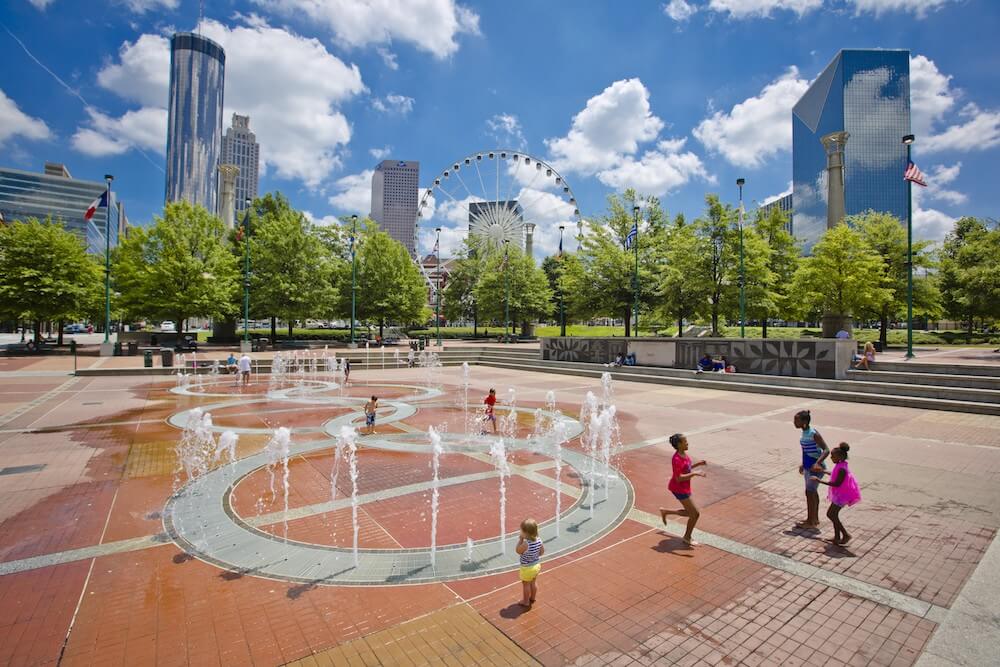Dr. Martin Luther King, Jr. left an impactful mark not only in Georgia, but all across the world. Today, students can learn how the civil rights leader shifted the course of history in various stops throughout Georgia, highlighting spots like his birthplace, and historic churches and civil rights museums.
Groups can quite literally walk in King’s footsteps to see how he became a major icon for peace and social justice. With over a dozen stops on Georgia’s Footsteps of Dr. Martin Luther King, Jr. Trail, Atlanta is a major destination that became the cultural catalyst for the 1960s civil rights movement.
Students can see where Dr. King was born, lived and where he was laid to rest at Martin Luther King, Jr. National Historical Park, or visit the Center for Civil and Human Rights.
“Georgia’s Footsteps of Dr. Martin Luther King, Jr. Trail is an opportunity to discover the locations that played a critical role in the nation’s civil rights movement,” said Kevin Langston, deputy commissioner of tourism for the Georgia Department of Economic Development. “The trail’s historic landmarks will undoubtedly educate and inspire visitors to carry on Dr. King’s legacy by serving others.”
ASK
Georgia Department of Economic Development
404-962-4175
exploregeorgia.org
Martin Luther King, Jr. Birth Home
Atlanta

Credit: NPS
Located in the Auburn Avenue Historic District, the Martin Luther King, Jr. Birth Home is a must-visit for groups touring Atlanta. The home is a two-story house with a front porch, parlor, study, kitchen, dining room, bedroom and bathroom on the first level. The second floor includes four bedrooms and a bathroom. Tours of the home are conducted by the National Park Service. Registration is required at the Martin Luther King, Jr. National Historical Park Visitor Center.
Martin Luther King, Jr. National Historical Park
Atlanta

Credit: ExploreGeorgia.org
Commemorating the area where Dr. King was born, lived, worshiped and is now buried, the Martin Luther King, Jr. National Historical Park conducts a variety of programs, and park rangers are on-site to provide information and answer questions. Students can walk in Dr. King’s footsteps, see where he played as a child and hear the story of how he was an instrument for social change in the United States during a time of segregation.
First African Baptist Church and Martin Luther King, Jr. Monument Park
Dublin

Credit: Visit Dublin
As Dublin’s oldest church, the First African Baptist Church once held an oratory contest for the Colored Elks Club of Georgia, and the winner was Martin Luther King, Jr. Across the street, students can view a vibrant mural and listen to an audio tour in Monument Park, recapturing that experience and other memories of First African Baptist Church members during the civil rights movement.
Ralph Mark Gilbert Civil Rights Museum
Savannah

Credit: Geoff L. Johnson
The Ralph Mark Gilbert Civil Rights Museum chronicles the civil rights movement in Savannah, Georgia’s oldest city. The museum is named in honor of Rev. Ralph Mark Gilbert, who was the pastor of First African Baptist Church from 1939 to 1956, and president of the Savannah branch of the NAACP from 1942 to 1948. Students can explore photographs and exhibits that capture key civil rights struggles in Savannah, including demonstrations at Levy’s Department Store.
Albany Civil Rights Institute
Albany

Credit: Todd Stone
Visit the Albany Civil Rights Institute to learn the story behind the Albany Movement — a coalition of residents, churches and their congregations, students and civil rights organizations that led a grassroots campaign to end discrimination in public facilities and achieve voters’ rights across southwest Georgia. The institute sits next to Mt. Zion Baptist Church, a historic building that was the primary site of mass meetings. Browse exhibits, and on every second Saturday of the month, hear performances by the Freedom Singers.











